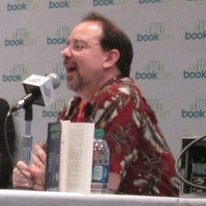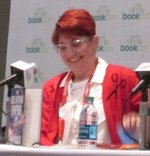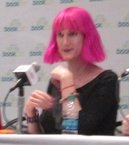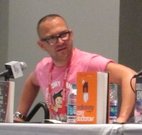|
My first love in reading and writing has always been genre fiction. By that, I mean science fiction, fantasy and horror. These are what inspired me to write in the first place. So if there's a panel with some awesome writers in the genre, sign me up! The second panel I attended at BookCon was put on by Tor, one of the giants of genre publishing, and looked to be right up my alley. I wasn't disappointed, either. The four panelists (pictured below) had the audience constantly cracking up with their dry and often self-deprecating humor.  John Scalzi John Scalzi The subject of the panel was Resistance in Science Fiction. And the panelists were eager to explain what resistance meant to them and how they tried to implement it in their writing. [When I take notes at an event, I write it out longhand in a notebook, and I must say I'm not always the fastest transcriber around. I paraphrased the questions/answers that I didn’t manage to write down verbatim, but I tried to stick as closely as possible to what was asked/answered.] There wasn't a moderator, although the panelists took turns asking questions to help keep the discussion moving. The first question/statement was about whether politics had any place in science fiction, referring to the recent behind-the-scenes conflict in genre fiction between conservatives and liberals. This sparked a number of jokes, in addition to some deeper discussion of the subject. Annalee – "Basically by lying and setting our books in alternate history and in the future, we can tell stories we can't tell with nonfiction." Cory – "One thing science fiction can do is not predict the future, but give us a direction to head towards." John – SFWA (Science Fiction Writers of America) always had political conflict. During the Vietnam War, half of the organization took out a full page ad supporting the war. And the other half took out an ad against the war. Mr. Scalzi gets emails from readers who disagree with him politically and say they won't read his books anymore. He sends back an email saying, "Kiss my ass." Annalee – "Politics are a huge part of our lives and that's what makes it interesting. … Humans are into conflict." Charlie – "There's no way to depoliticize science at this point. … People have different views of science in politics. … Science fiction is about the future, but writers and readers live today." Charlie – "How can we as science fiction writers give people the tools to resist?"  Annalee Newitz Annalee Newitz Annalee – "What I like to see in science fiction and what I try to do … [are] when things aren't as black and white." Like speaking up at a racist statement made by a co-worker/boss and losing your job – that is an ambiguous problem. "A complicated character in science fiction can't just be Superman." Cory – "I think there's something that changed in science fiction and technology. … [A] vein of technorealism now coming up in science fiction. … Science fiction is engaging with technology that people use in their lives" every day, like computers. John – Being a straight, rich, white male, "I am not the right person to write resistance from lots of different viewpoints. … The literature of resistance that comes out of me is from where I am." [Got a round of applause from the audience.] Charlie – "I think we should do much more to … decolonize our field." Talked about what she termed "wonk-punk," – books that are wonky, like about tax law, etc. that fall outside the direct genre boundaries. John – Do writers have the duty as individuals to be a beacon?  Charlie Jane Anders Charlie Jane Anders Charlie – "As a visible transgender person who is dealing with my shit, I think I am making a statement just by existing." [Got a round of applause from the audience.] Cory – The way he decides how to balance the actions in his life is by asking himself the question: "Will I regret this on my deathbed?" AUDIENCE QUESTIONS  Cory Doctorow Cory Doctorow Question: How are science fiction and fantasy received in non-democratic countries? John – "Circumstances on how the reader reads the book will have an influence on them." Readers find things in the work that the writer didn't mean to put in there. Cory – The internet helps propagate science fiction in non-democratic countries. Annalee – Also, these authoritarian places produce some great science fiction. Question: What about gender in science fiction? Annalee – "Expectations [are] based on gender," but genders aren't assigned. John – As an experiment, he wrote a book with Chris, an ungendered character, to see how people would react. Women were evenly split. Half thought the character was female, half thought male. But with men, it was about 97% who thought Chris was a dude, which he thought was interesting. Question: How can a writer characterize oppressors? Charlie – "It is important to get into the heads of all your characters. … What's interesting about fiction is it lets us identify with villains as well as heroes." John – "Very few people ever think they're the bad guy." NEXT BLOG POST: Part 3 will be about Margaret Atwood's panel on The Handmaid's Tale.
0 Comments
Leave a Reply. |
Who the heck is Alison McBain?I am a freelance writer and poet with over two hundred short pieces published in magazines and anthologies. Check out my 2024 writing challenge to write a book a week at Author Versus AI. For more info, please check out my "About Me" page. © Alison McBain. All rights reserved
Archives
July 2024
|





